Today’s Current Affairs: 2nd Jun 2023 for UPSC IAS exams, State PSC exams, SSC CGL, State SSC, RRB, Railways, Banking Exam & IBPS, etc
Table of Contents
MH-60 ‘Romeo’ Multi-Mission Helicopter:

The Indian Navy recently achieved a unique feat after an MH-60 ‘Romeo’ multi-mission helicopter landed on the indigenously-built aircraft carrier INS Vikrant.
- MH-60 Romeo Helicopter is the world’s most advanced maritime helicopter and is the most capable naval helicopter available today designed to operate from frigates, destroyers, cruisers and aircraft carriers.
- It is manufactured by US defence major Lockheed Martin.
- It is an all-weather helicopter designed to support multiple missions with state-of-the-art avionics and sensors.
- Main missions of the MH-60R Seahawk are Anti-Submarine Warfare (ASW) and Anti-Surface Warfare (ASuW).
- This helicopter can detect and track submarines and surface ships and attack with torpedoes and missiles.
- Secondary missions are search and rescue, combat search and rescue, vertical replenishment, medical evacuation and insertion and extraction of special forces.
- This helicopter is operated by a crew of 4 in anti-submarine warfare role and crew of 5 in anti-surface warfare role. It can also accommodate additional passengers.
- It carries advanced airborne active sonar, multi-mode search radar and nose-mounted forward-looking infrared (FLIR) turret.
Offer For Sale :Govt To Sell Up To 3% Stake In Coal India

The Union government proposes to sell up to 3% stake in state-owned coal India through an offer for sale (OFS).
- OFS is a simpler method of share sale through the exchange platform for listed companies.
- The OFS method was brought in by the Securities and Exchange Board of India (SEBI) in 2012 as a simpler one to aid promoters of listed forms to dilute their stake and comply with the minimum public shareholding norms by June 2013.
- The method was largely adopted by listed companies, both state-run and private, to adhere to the SEBI order.
- Later, the government started using this route to divest its shareholding in public sector enterprises.
- Unlike a follow-on public offering (FPO), where companies can raise funds by issuing fresh shares or promoters can sell their existing stakes, or both, the OFS mechanism is used only when existing shares are put on the block.
- Only promoters or shareholders holding more than 10 per cent of the share capital in a company can come up with such an issue.
- The mechanism is available to 200 top companies in terms of market capitalisation.
- In an OFS, a minimum of 25 per cent of the shares offered, are reserved for mutual funds (MFs) and insurance companies.
- At any point, no single bidder other than these two institutional categories is allocated more than 25 per cent of the size of the offering.
- A minimum of 10 per cent of the offer size is reserved for retail investors.
- A seller can offer a discount to retail investors either on the bid price or on the final allotment price.
Inter-Ministerial Committee (IMC) For World’s Largest Grain Storage Plan:
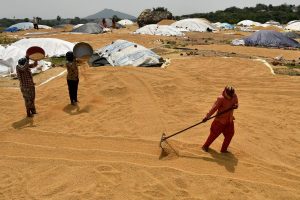
The Union Cabinet approved forming and empowering an Inter-Ministerial Committee (IMC) to create the world’s largest grain storage plan in the cooperative sector.
- In order to ensure time-bound and uniform implementation of the Plan in a professional manner, the Ministry of Cooperation will implement a pilot project in at least 10 selected districts.
- The Pilot would provide valuable insights into various regional requirements of the project, learnings from which will be suitably incorporated for country-wide implementation of the Plan.
- An inter-ministerial committee (IMC) will be formed under the chairmanship of the Minister of Cooperation, with ministers of Agriculture and Farmer’s Welfare, Consumer Affairs, Food and Public Distribution, Food Processing Industries, and secretaries as members “to modify guidelines/ implementation methodologies of schemes of the respective ministries as and when the need arises”.
- Aim is to address the shortage of agricultural storage infrastructure in the country by facilitating the establishment of godowns at the level of primary agricultural credit societies (PACS) and also enables PACS to undertake various other activities.
Electronics Repair Services Outsourcing (ERSO) Initiative:

The Union Ministry of Electronics & IT launched the ERSO Pilot initiative to validate certain transformational policy and process changes to make India the Repair Capital of the World.
- Electronics Repair Services Outsourcing (ERSO) initiative aims to promote India as a hub for repairing electronic goods and to assess the feasibility and potential of capturing 20% of the global repair service market within five years.
- The pilot is being held in Bengaluru and will be run for three months.
- India’s e-waste policy will be modified to enable repair companies to domestically recycle 5% of imported goods by weight on a trial basis.
- The repaired goods will not be permitted to be sold in the domestic market.
- New provisions will be made to allow their exportation to regions other than their country of origin.
- Nodal Ministry: Ministry of Electronics & IT.
CITIIS 2.0 Program:

The Union Cabinet chaired by the Indian Prime Minister has approved the City Investments to Innovate, Integrate and Sustain 2.0 (CITIIS 2.0) programme.
- CITIIS 2.0 is a program conceived by the Ministry of Housing and Urban Affairs (MoHUA) in partnership with the French Development Agency (AFD), Kreditanstalt für Wiederaufbau (KfW), the European Union (EU), and National Institute of Urban Affairs (NIUA).
- The program will run for four years, from 2023 to 2027.
- The program envisages supporting competitively selected projects promoting a circular economy with a focus on integrated waste management at the city level, climate-oriented reform actions at the State level, and institutional strengthening and knowledge dissemination at the National level.
- The funding for this program would include a loan from AFD and KfW and a technical assistance grant of Rs.106 cr from the EU.
Evergreening Of Loans : RBI
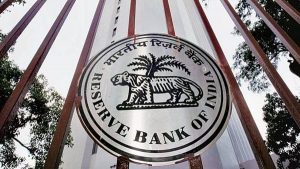
The Governor of the Reserve Bank of India (RBI), recently addressed bank boards and expressed concerns about banks adopting over-aggressive growth strategies and engaging in the evergreening of loans.
- The governor emphasized the need for robust corporate governance and highlighted instances of concealing the true status of stressed loans.
- Evergreening loans, a form of zombie lending, is a practice of extending new or additional loans to a borrower who is unable to repay the existing loans, thereby concealing the true status of the non-performing assets (NPAs) or bad loans.
- Approaches Utilised for Evergreening Loans:
- Selling and buying back loans or debt instruments between two lenders to avoid classifying them as NPAs.
- Persuading good borrowers to enter into structured deals with stressed borrowers to hide their default.
- Using internal or office accounts to adjust the repayment obligations of borrowers.
- Renewing or disbursing new loans to stressed borrowers or related entities closer to the repayment date of earlier loans.
Lightweight Payment And Settlement System : RBI
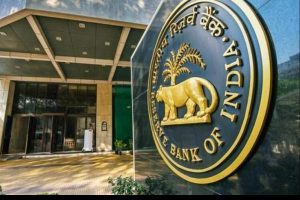
The Reserve Bank of India (RBI) recently announced plans to introduce a ‘Lightweight’ Payment and Settlement System (LPSS) for emergencies which was proposed in RBI’s annual report for 2022-23.
- The lightweight system aims to provide resilience and continuity of payment and settlement systems while ensuring efficiency during emergencies.
- LPSS is independent of conventional technologies and wired networks that underlie existing payment systems such as UPI, NEFT, and RTGS.
- As a part of the ‘Utkarsh 2.0’ initiative, RBI will put in place a resilient framework for oversight of Centralized Payment Systems — NEFT and RTGS.
- It will also look to upgrade the RTGS system, including improvements to the existing ones and the introduction of new functionalities.
- LPSS for emergencies ensures resilience and continuity of payment and settlement systems during extreme and volatile situations.
- Conventional payment systems like UPI, NEFT, and RTGS are vulnerable to disruptions caused by natural calamities or war due to their dependence on complex wired networks and advanced IT infrastructure.
- Disruptions in existing systems can affect liquidity pipeline and hamper essential payment services.
- Lightweight system provides a portable and easily activated solution that can be operated remotely with minimal resources.
- It serves as a backup option for critical transactions, maintaining stability and ensuring the availability of essential payment services.
- The system will have a bare minimum of trained staff who will handle payment and settlement operations securely and efficiently.
- They will also coordinate with government agencies, financial institutions, market participants, and service providers.
- The system will process only those transactions that are crucial for maintaining the stability of the economy, such as government and market-related transactions.
- Retail or individual transactions that can be deferred or conducted through alternative modes will not be handled.
- The system will employ a simplified mechanism to ensure the integrity and validity of transactions.
- It will also maintain transaction records for reconciliation and audit purposes.
World Milk Day : 1st June 2023
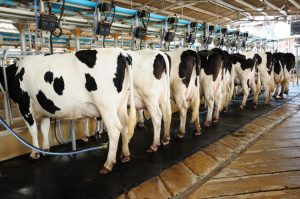
The Department of Animal Husbandry and Dairying, in partnership with the Agriculture Production Department of the Government of Jammu and Kashmir, is gearing up to celebrate World Milk Day on June 1, 2023.
- The occasion will be marked by a Summer Meet for the animal husbandry and dairying sector, taking place from June 1st to 2nd at SKICC in Srinagar, Jammu and Kashmir.
- This event aims to raise awareness about the nutritional value and advantages of milk, while also acknowledging the significant contributions of dairy farmers, processors, and consumers.
- The event will review the progress of ongoing schemes, discuss outcomes, and identify mid-course corrections as necessary.
- As part of the event, “Feeding the Future: Five Days of Action for Feed and Fodder and Training of A-HELP for 2023-24” campaign will be launched.
- This initiative aims to address the critical aspects of feed and fodder management for livestock while providing training through the A-HELP program.
- In 2001, World Milk Day was established by the Food and Agriculture Organisation of the United Nations to recognize the importance of milk as a global food, and to celebrate the dairy sector.
- India is the highest milk producer in the world contributing 23% of global milk production in the year 2021-22.
- The top five major milk-producing states are Rajasthan, Uttar Pradesh, Madhya Pradesh, Gujarat and Andhra Pradesh.
75 Years Of UN Peacekeeping:
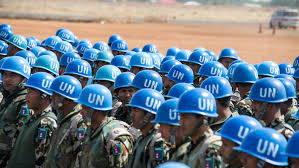
The Indian Army commemorated the 75th International Day of United Nations (UN) Peacekeepers on 29th May (which was designated by the UN General Assembly) at the National War Memorial in New Delhi.
- Theme 2023: ‘Peace begins with me’.
- This day holds significance as it marks the anniversary of the first UN peacekeeping (UNPK) mission in 1948.
- India unveiled plans to conduct two initiatives later in 2023, specifically designed to train women personnel from South East Asia, as part of their collaboration with ASEAN in the defence sector.
- Indian peacekeepers have served in various UN missions worldwide, with a current deployment of 6,097 personnel.
- However, India has also experienced the highest number of fatalities due to malicious acts during these missions.
- Out of the 71 peacekeeping operations conducted so far, three missions stand out with significant Indian troop casualties.
New Excavations At Delhi’s Purana Qila:

New excavations at Delhi’s Purana Qila (Old Fort) have uncovered evidence of a pre-Mauryan era settlement.
- The ongoing excavation aims to establish a complete chronology of the site and provide further insights into the ancient city of Indraprastha.
- The site is considered significant as it may have been the location of Indraprastha mentioned in the Mahabharat.
- The findings include pottery shards dating back to around 1200 BC to 600 BC, a 2,500-year-old ring well from the Mauryan era, and a four-room complex believed to be 2,300 years old.
- Nine cultural levels, representing different historical periods including the pre-Mauryan period
- The excavations have also revealed coins, seals, and other artefacts, indicating the site’s role as a trade centre.
- The stone image of Vaikuntha Vishnu, a terracotta plaque of Gaja Laxmi, a stone image of Ganesha, terracotta figurines of humans and animals, beads of various stones, a bone needle etc.
- Purana Qila is the oldest fort in Delhi, located on the banks of the Yamuna River.
- It is believed to have been built by the Pandavas for their kingdom Indraprastha.
- Mughal Influence Renovated by Emperor Humayun in 1533, it took five years to complete.
- Dinpanah The fort was constructed within Dinpanah, a small city in Delhi.
- Sher Shah Suri’s Reign Sher Shah Suri captured the fort in 1540 and made several additions, naming it Shergarh.
India’s First Facility To Produce Rare Earth Permanent Magnets:

The PM has inaugurated India’s first facility to produce rare earth permanent magnets in Visakhapatnam.
- A permanent magnet is a type of magnet that can create a magnetic field without needing any external power source.
- It is called “permanent” because once it is magnetized, it can maintain its magnetism for a long time.
- Permanent magnets are usually made from certain types of metals or alloys, such as iron, nickel, and cobalt, or rare earth elements like neodymium and samarium.
- Rare earth permanent magnets are a type of permanent magnet that is made from rare earth elements.
- Rare earth elements are a group of seventeen chemical elements in the periodic table, including elements such as neodymium, samarium, and dysprosium.
World Energy Investment Report 2023:

The International Energy Agency has released the World Energy Investment Report 2023
Key findings of the Report:
- Investment in clean energy has increased in recent years Investments in clean energy have surpassed investments in fossil fuels by 70%; Transition driven by Electric Vehicles (EVs) and renewable power; $1.7 allocated to clean energy for every $1 spent on fossil fuels.
- Clean energy investments concentrated in advanced economies Over 90% of the surge in clean energy investment since 2021 is in advanced economies and China; India shows strong investment in solar energy.
- Challenges in transitioning towards clean energy Hurdles include higher interest rates, ambiguous policy frameworks, market designs, financially constrained utilities, and high cost of capital.
International Energy Agency:
- The IEA is an inter-governmental organization, HQ: Paris.
- It ensures the security of oil supplies and promotes energy cooperation among member countries
- Established in 1974 to ensure the security of oil supplies
- It is within the OECD framework
Global Hunger Hotspots:
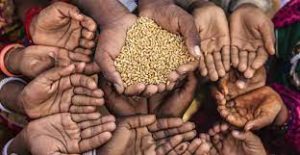
According to a new report published by United Nations, several parts of the world faces increase in acute food insecurity. India’s neighbors, Pakistan, Afghanistan and Myanmar, are among the hunger hotspots in the world.
- Global Hunger Hotspots: Acute food insecurity can potentially increase in magnitude and severity for 18 areas in 22 countries, according to the Food and Agriculture Organization of the United Nations (FAO) and the World Food Programme (WFP).
Findings of the report titled “Hunger Hotspots FAO‑WFP early warnings on acute food insecurity”:
- Highest concern level countries: Afghanistan, Nigeria, Somalia, South Sudan, Yemen Haiti, Burkina Faso and Mali.
- Highest concern level countries have populations facing or projected to face starvation or are at risk of deterioration towards catastrophic conditions, given they already have critical food insecurity and are facing severe aggravating factors.
- These countries require the most urgent attention.
- Hotspots with very high concern countries: Pakistan, the Central African Republic, Ethiopia, Kenya, the Democratic Republic of the Congo, the Syrian Arab Republic and Myanmar.
- These hotspots have many people facing critical acute food insecurity, coupled with worsening drivers that are expected to intensify life‑threatening conditions in the coming months.
- Hunger hotspot countries: Lebanon, El Salvador, Nicaragua, Malawi, Guatemala and Honduras.
All India Survey Of Higher Education (AISHE) Survey 2020-21:
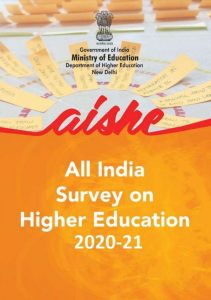
The All India Survey of Higher Education (AISHE) Survey 2020-21 conducted under the Ministry of Education found that the Muslim community’s enrolment in higher education declined at a time when the enrolment of SCs, STs and OBCs improved.
- All India Survey of Higher Education is an annual web-based survey, which started in 2010-11 and conducted by Ministry of Education.
- Various parameters of data collection includes teachers, student enrolment, programmes, examination results, education finance, and infrastructure.
- For the first time, the Higher Education Institutions (HEIs) of India have filled their data using an entirely online data collection platform through the Web Data Capture Format (Web DCF) developed by the Department of Higher Education and the National Informatics Centre (NIC).
Key findings from the report:
- Gross Enrolment Ratio(GER) for all enrolments (as per 2011 Census) increased by over 2 points to 27.3.
- The female enrolment in higher educationprogrammes had increased to 49% of total enrolments in 2020-21 compared to 45% in 2019-20.
- More SC students who were enrolled in 2020-21 compared two lakh to the previous year.
- The year also saw about three lakh more ST students and six lakh more OBC students being enrolled for higher education.
- The proportion of Muslim students enrolling for higher education dropped to 4.6% in 2020-21 from 5.5% in 2019-20
- During 2020-21, the number of universities has increased by 70, and the number of colleges has increased by 1,453.
- The female per 100 male faculty has improved to 75 in 2020-21 from 74 in 2019-20 and 63 in 2014-15.




